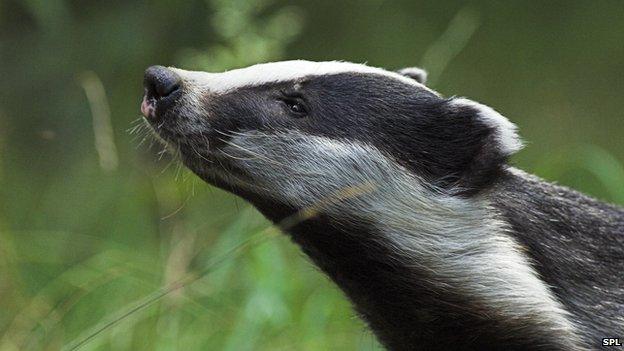Badger cull extended as kills fall short of target
- Published

The numbers of badgers in both cull regions has been revised significantly downwards
Environment Secretary Owen Paterson has told the House of Commons that extensions of the badger culls in west Somerset and Gloucestershire are now being considered by Natural England.
In a written statement, Mr Paterson said that the pilot culls could be extended by up to three weeks as marksmen have failed to kill enough badgers to reach their original targets.
He told the Commons that 850 badgers had been shot in Somerset during the six-week trial, just over 40% of an initial target of 2,081.
But he insisted the Somerset scheme had been effective and successful.
The controversial pilot culls set out to study if badgers could be killed safely, effectively and humanely.
They are being carried out in an attempt to control TB in cattle, which can be spread by badgers - though opponents say the culls will have no impact.
The plan was to kill 70% of the badgers in the areas of west Somerset and Gloucestershire by free shooting.
Across both regions, this meant around 5,000 badgers were to be killed in total.
Decline in numbers
But the environment secretary said these targets were based on population estimates from 2012 that have proven to be highly inaccurate.
As the cull started in August, hundreds of hair traps were set so that DNA could be extracted and analysed to give a more up-to-date assessment of badger numbers.
In west Somerset, the environment secretary said the badger population, which had been estimated at 2,400, was now being revised downwards to 1,450. In Gloucestershire, the numbers have been lowered from 3,400 to 2,350.
There are a number of reasons behind the apparent decline according to Mr Paterson, including the impact of last winter's bad weather, disease and lack of food.
"These badger populations go up and down," he said.
"We're dealing with a wild animal, whose numbers will go up and down depending on weather, disease and other conditions."
As a result of the updates, the targets for culling have also been revised downwards to about 2,600 for both areas combined.
"Badgers moved the goalposts," Mr Paterson told BBC Spotlight in the West Country.
To kill 70% of the badgers now estimated to live in west Somerset, the culling company needs to kill 1,015 badgers.
After six weeks of shooting, they had achieved 59%, and the company is now seeking an extension of its licence for another two to three weeks.
Peter Kendall, president of the National Farmers' Union, said the number of badgers to be killed had been reduced because it was important not to "wipe out" entire populations.
'Protester activity'
He told BBC Breakfast the marksmen needed "a few more weeks" to "meet the best criteria that the scientists have set".
"Last year, 38,000 cattle were killed and we've got to do something about the spread of this ghastly disease," he added.
Asked why the desired number of badgers had not been killed, especially given the lower total population now estimated, Mr Kendall said these were pilot schemes and those involved are "learning as we go".
Peter Kendall, NFU: "We have got to do something about the spread of this ghastly disease"
He said there had been some "protester activity" and all shooting had been stopped whenever a person was "spotted in a vicinity", though he said the protesters were not the reason the target number had not been reached.
The environment secretary said that even on the lower figures, the culling exercise had been effective.
"The chief veterinary officer has advised that the 60% reduction this year will deliver clear disease benefits as part of a four-year cull," he told the House.
Mr Paterson said that the culling company carrying out the Gloucestershire cull had also sought an extension.
The Labour Party were quick to condemn the move for an extension of the cull, with new Shadow Environment Secretary Maria Eagle saying the process was "entirely bad."
"Culling is not working, not effective and not based on any scientific evidence," she said.
Any extension of the culling period could, in fact, increase the spread of TB as badgers were disturbed by the shooting, she said.
Campaigning groups also criticised the extensions and the new numbers, saying they were suspiciously convenient. They also criticised the increased costs that would result.
"We estimate that the cull so far has cost around £2m, including police costs," said Dominic Dyer, policy advisor for Care for the Wild International.
"If they kill around 2,000 badgers, that works out at about £1,000 each - this must be the most expensive cull in history. Vaccinating badgers would be much cheaper."
- Published6 September 2013
- Published2 September 2013
- Published27 August 2013
- Published9 October 2013